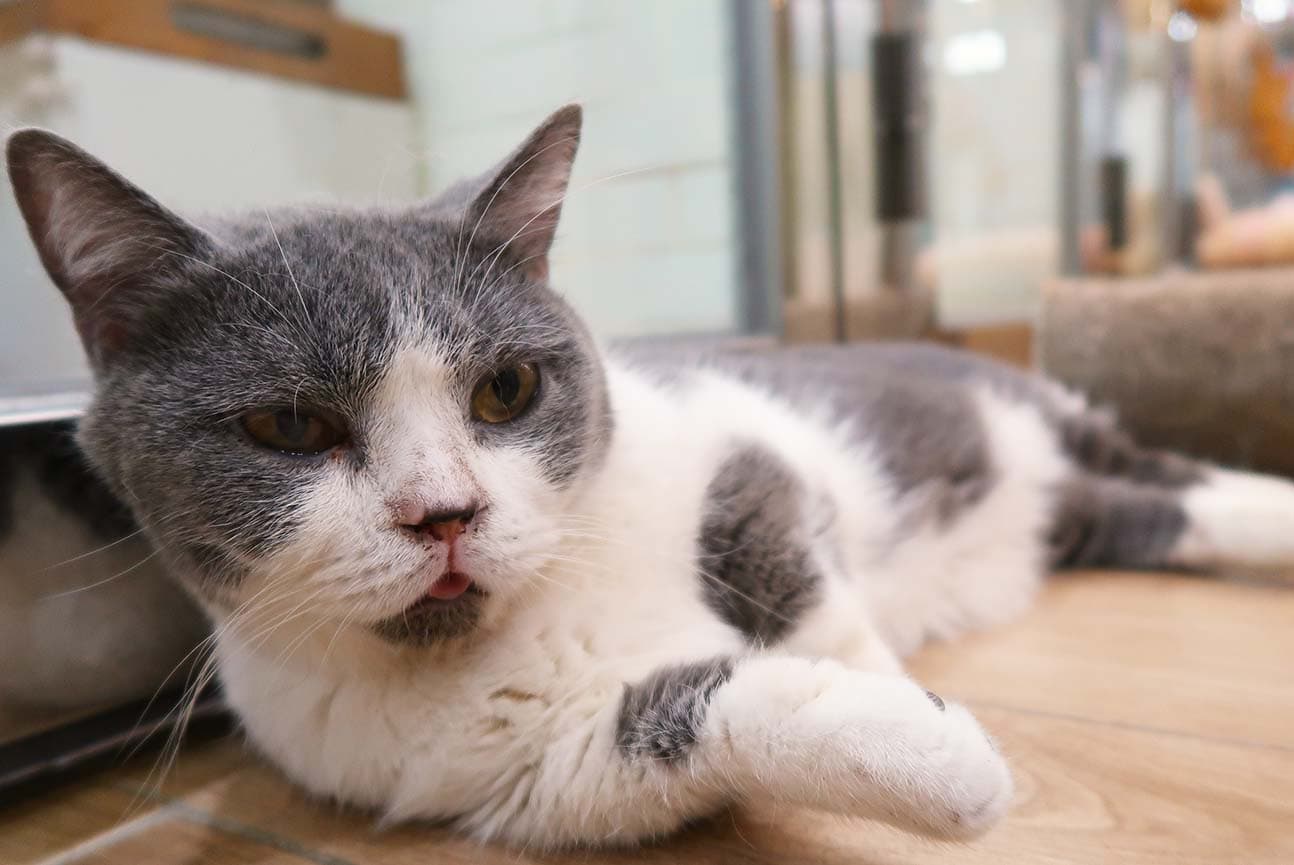Reviewed by Dr. Tetiana Filenko
Updated on 23/10/2025
Reading time 4 min.
Overview
Severity: Low
Life stage: All
As a cat owner in Dubai, you might enjoy sharing the occasional healthy snack with your feline friend. However, some foods that are perfectly safe for humans can be extremely dangerous for cats. Grapes and raisins are among the most serious toxic foods your cat could encounter, and understanding this risk could save your pet’s life.
Whilst grape and raisin poisoning in cats remains relatively rare compared to dogs, the consequences can be devastating when it occurs. Here at Modern Vet, we’ve seen firsthand how quickly this type of poisoning can progress, which is why we want every Dubai cat owner to be prepared.
Overview: Are Grapes and Raisins Toxic to Cats?
Grape and raisin poisoning in cats is not well understood and is fairly rare. Research shows that approximately 15% of cats that consume grapes or raisins will develop signs of toxicity. What makes this particularly concerning is that there is no well-established toxic dose, and some cats may have individual sensitivities, causing poisoning to occur with smaller ingestions.
All grape-derived products pose the same risk, including sultanas, currants, and Zante currants. Recent research suggests that the damage may be caused by tartaric acid, which is also present in tamarinds and is used for baking as cream of tartar. This means that products containing these ingredients should also be avoided.
In Dubai’s warm climate, dried fruits like raisins are often more readily available than fresh grapes, making raisin exposure a particular concern for local pet owners. In severe cases, raisin poisoning in cats can cause life-threatening kidney failure.
Symptoms of Grape and Raisin Poisoning in Cats
Recognising the early warning signs of grape or raisin poisoning is important. The progression typically follows this pattern:
Within 6-24 hours after ingestion
- Intense vomiting (often the first and most common sign)
- Loss of appetite
- Lethargy and weakness
- Diarrhoea
- Abdominal pain
24-48 hours after ingestion (signs of kidney problems)
- Excessive thirst and increased urination (initially)
- Dehydration
- Bad breath with an ammonia-like smell
- Reduced or completely stopped urination
- Weakness, stumbling, or trembling
- In severe cases: seizures
In Dubai’s hot climate, it’s especially important to distinguish between normal increased thirst caused by the heat and excessive drinking that may signal an underlying medical problem.
Cats at Higher Risk
Currently, all cats are considered to be at risk of poisoning, as we don’t know why some animals seem more sensitive than others.
In Dubai’s multicultural environment, it’s worth noting that raisins feature prominently in many traditional cuisines and festive foods, from Middle Eastern ma’amoul to South Asian biryanis, making accidental exposure more likely during celebrations and gatherings.
Diagnosis
Diagnosis of grape or raisin poisoning is usually based on finding out about ingestion and the symptoms. When you bring your cat to Modern Vet, our veterinary team will:
- Take a detailed history of what your cat may have consumed
- Perform a thorough physical examination
- Run blood tests to check kidney function (particularly important after about 24-48 hours when kidney damage can be detected)
- Analyse urine samples to assess kidney function
- Potentially perform imaging studies if complications are suspected
Grape and raisin poisoning is time-sensitive. Even if you’re not certain your cat has consumed grapes or raisins but they’re showing symptoms, it’s best to seek immediate veterinary attention.
Veterinary Treatment at Modern Vet
The approach to treating grape and raisin poisoning focuses on preventing further absorption of toxins and supporting your cat’s organs, particularly the kidneys.
Immediate treatment (within 1-2 hours of ingestion):
- Emptying the stomach through induced vomiting or gastric lavage under anaesthesia
- Activated charcoal administration to reduce toxin absorption from the gut
Ongoing supportive care:
- Hospitalisation with intensive monitoring
- Intravenous fluid therapy to protect the kidneys and eliminate toxins
- Anti-nausea medications to control vomiting
- Strong diuretics if urine production decreases
- Regular blood tests to monitor kidney function
- Nutritional support as needed
Dubai’s advanced veterinary facilities, including our 24-hour emergency services at Modern Vet, mean that comprehensive treatment is readily available. Our emergency pet care operates 24/7, ensuring immediate access to life-saving treatment.
What NOT to Do at Home
Inducing vomiting at home should be avoided as this is difficult to do and can waste precious time, with significant risk of serious complications like aspiration pneumonia.
- Don’t try to make your cat vomit
- Don’t give milk or food
- Don’t wait to see if symptoms develop
- Do contact Modern Vet immediately
- Do bring any packaging or evidence of what was consumed
- Do note the time of ingestion if known
Prevention: Keeping Your Dubai Cat Safe
Prevention is always better than treatment. Here’s how to grape-proof your Dubai home.
Kitchen safety:
- Check labels of baked goods for grapes, raisins, sultanas, Zante currants, tamarinds, cream of tartar, tartaric acid, or potassium bitartrate
- Store all potentially dangerous foods in secure, cat-proof containers
- Clean up immediately after cooking or baking
Family education:
- Make sure everyone in the household knows grapes and raisins can be dangerous to cats
- Consider putting warning labels on dangerous food items
Dubai-specific considerations:
- Be extra cautious during cultural celebrations when traditional sweets containing raisins are common
- Check imported treats and snacks, as labelling standards may vary
- Be aware that cream of tartar can easily be caught in your cat’s coat and be ingested while grooming
Long-term Outlook and Living with Recovery
The prognosis for grape and raisin poisoning largely depends on how quickly treatment begins and the extent of kidney damage. The kidneys do not recover well from injury, and most damage will be permanent.
Some cats that recover may need:
- Regular kidney function monitoring
- Special diets designed for kidney support
- Increased access to fresh water
- Ongoing medication
- More frequent veterinary check-ups
Dubai’s climate adds an extra consideration for cats with compromised kidney function, as the heat can lead to dehydration more quickly. Ensuring constant access to fresh water and air conditioning becomes even more important for these cats.
When to Seek Emergency Help
Contact Modern Vet immediately if your cat:
- Has eaten even a small amount of grapes, raisins or any products containing cream of tartar
- Is drinking and/or urinating excessively or not passing urine at all
- Shows weakness, stumbling, tremors or seizures
Our 24-hour emergency line ensures expert veterinary care is always available when you need it most.
Remember, when it comes to grape and raisin poisoning, there’s no such thing as being too cautious. If you have any doubts about your cat’s health or potential exposure to toxic substances, don’t hesitate to contact our team at Modern Vet. We’re here to provide expert, compassionate care for your beloved pet, 24 hours a day.
Share this, choose your platform!
Reviewed by
Dr. Tetiana Filenko
DVM
Dr. Tetiana was born and grow up in Ukraine. Throughout her life she always had pets and was always the one person in her family to look after them. At childhood she was helping stray animals in her spare time, this determined her choice of university and her decision to further her career in the study of veterinary medicine.


